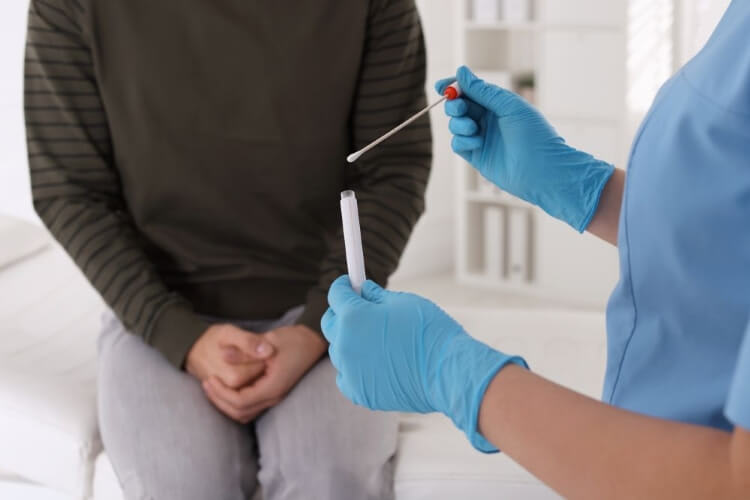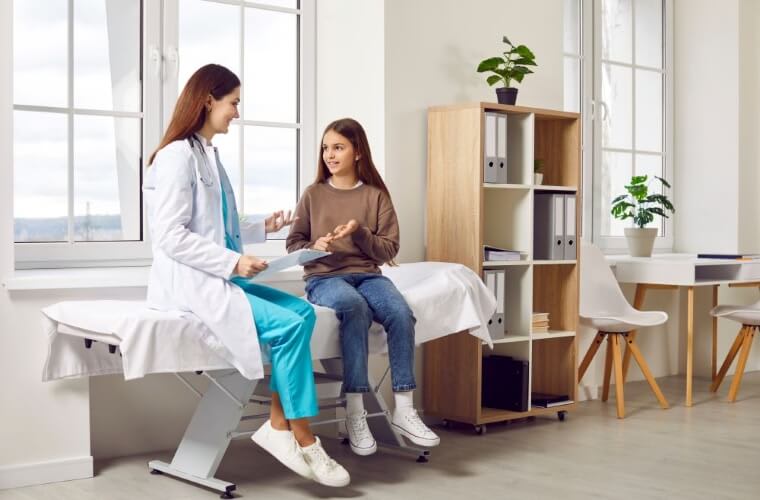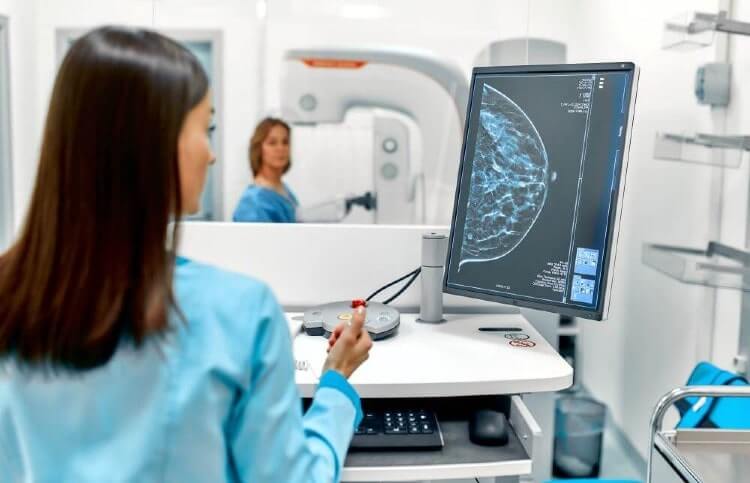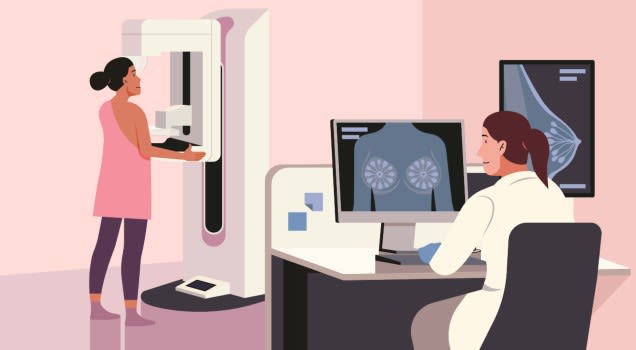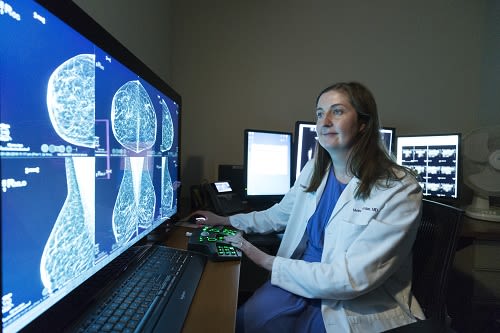Think you are at high risk for breast cancer? We can support you
Published: October 24, 2023l
By Arlene Butler, APRN
Do you know your breast cancer risk? If not, you should.
Although a yearly mammogram starting at age 40 for most people is the first step in guarding breast health, it can only detect — not prevent – breast cancer. Understanding your own individual risk of breast cancer, and the specific things you could be doing to minimize that risk, is the best way to manage your breast health. Stamford Health’s High-Risk Breast Cancer Screening Program can help you understand your risk and create an individually tailored plan of care to manage your risk.
Breast cancer is the most common cancer in the world, and the second leading cause of cancer death in American women. One in 8 women will receive a diagnosis of breast cancer in their lifetime, with most occurring in post-menopausal women. In addition to family history, there are multiple factors that contribute to a woman’s lifetime risk score: age, weight, age at first birth, age of first menses (younger age would elevate risk), age of menopause (late menopause would elevate risk), hormone replacement therapy (HRT) use, breast biopsies, and more. Although family history is a known risk factor, more than 70% of women who have had breast cancer have no family history.
Stamford Health makes a commitment to the women in our community by calculating an individual’s lifetime risk of developing breast cancer at every mammogram. Using two quantitative instruments, your lifetime risk of developing breast cancer is calculated and determined as low, moderate, or high. If your lifetime risk is equal to or greater than 20%, then our high-risk coordinator will reach out to you and offer a referral to the High-Risk Breast Cancer Screening Program.
During an initial office visit with the high-risk breast specialist, your risk will be calculated, explained, and a personalized care plan will be developed in partnership with you. An individualized plan of care will include breast cancer screening recommendations as well as:
Genetics only make up about 10% of all cancers, which means our lifestyle and habits play an important role in staying healthy and preventing cancer. Following a low-fat, Mediterranean, or plant-based diet to achieve and maintain a healthy body weight; exercising at least three hours per week; limiting alcohol intake to two or three drinks per week; and quitting smoking are some of the recommendations we suggest to women to reduce lifestyle risk factors through healthy changes. Our Sarner Health and Fitness Institute also offers medically supervised fitness and lifestyle support. You can choose from an array of specialized programming, including water aerobics, yoga, personal training, and more.
Our breast experts partner closely with breast radiologists, primary care providers, obstetrics/gynecologists, integrative medicine and allied health therapists to ensure a holistic, evidence-based approach to wellness, and provide seamless coordination of care. The High-Risk Breast Cancer Screening Program welcomes all patients, whether you have comprehensive or no insurance. We will take exceptional care of you. Please call 203.276.4910 to learn more about our program.
Do you know your breast cancer risk? If not, you should.
Although a yearly mammogram starting at age 40 for most people is the first step in guarding breast health, it can only detect — not prevent – breast cancer. Understanding your own individual risk of breast cancer, and the specific things you could be doing to minimize that risk, is the best way to manage your breast health. Stamford Health’s High-Risk Breast Cancer Screening Program can help you understand your risk and create an individually tailored plan of care to manage your risk.
Breast cancer is the most common cancer in the world, and the second leading cause of cancer death in American women. One in 8 women will receive a diagnosis of breast cancer in their lifetime, with most occurring in post-menopausal women. In addition to family history, there are multiple factors that contribute to a woman’s lifetime risk score: age, weight, age at first birth, age of first menses (younger age would elevate risk), age of menopause (late menopause would elevate risk), hormone replacement therapy (HRT) use, breast biopsies, and more. Although family history is a known risk factor, more than 70% of women who have had breast cancer have no family history.
Stamford Health makes a commitment to the women in our community by calculating an individual’s lifetime risk of developing breast cancer at every mammogram. Using two quantitative instruments, your lifetime risk of developing breast cancer is calculated and determined as low, moderate, or high. If your lifetime risk is equal to or greater than 20%, then our high-risk coordinator will reach out to you and offer a referral to the High-Risk Breast Cancer Screening Program.
During an initial office visit with the high-risk breast specialist, your risk will be calculated, explained, and a personalized care plan will be developed in partnership with you. An individualized plan of care will include breast cancer screening recommendations as well as:
- Education on prevention and risk-reducing lifestyle changes.
- Additional imaging, such as a breast MRI (a highly sensitive test that can detect problems early) or breast ultrasound.
- Referral to specialists, such as a medical oncologist to discuss medication that may lower your breast-cancer risk, or to a genetic counselor, who can help you understand health conditions that run in your family.
- Regular follow-up exams to monitor and oversee your breast health.
Genetics only make up about 10% of all cancers, which means our lifestyle and habits play an important role in staying healthy and preventing cancer. Following a low-fat, Mediterranean, or plant-based diet to achieve and maintain a healthy body weight; exercising at least three hours per week; limiting alcohol intake to two or three drinks per week; and quitting smoking are some of the recommendations we suggest to women to reduce lifestyle risk factors through healthy changes. Our Sarner Health and Fitness Institute also offers medically supervised fitness and lifestyle support. You can choose from an array of specialized programming, including water aerobics, yoga, personal training, and more.
Our breast experts partner closely with breast radiologists, primary care providers, obstetrics/gynecologists, integrative medicine and allied health therapists to ensure a holistic, evidence-based approach to wellness, and provide seamless coordination of care. The High-Risk Breast Cancer Screening Program welcomes all patients, whether you have comprehensive or no insurance. We will take exceptional care of you. Please call 203.276.4910 to learn more about our program.
About the Author
Arlene Butler is a nurse practitioner at Stamford Health who navigates patients through our High-Risk Breast Cancer Screening Program.Featured Expert/ Author

Stamford Health Medical Group Member



